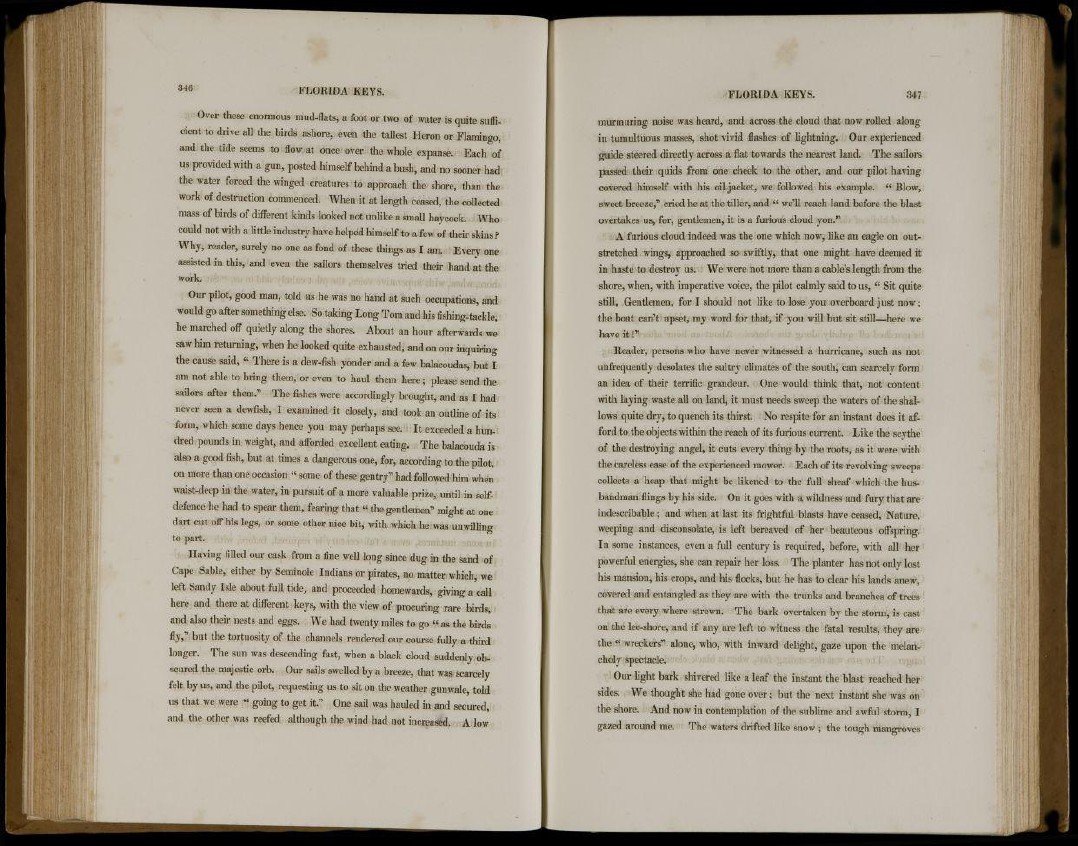
346 FLORIDA KEYS.
Over these enormous mud-flats, a foot or two of water is quite sufficient
to drive all the birds ashore, even the tallest Heron or Flamingo,
and the tide seems to flow at once over the whole expanse. Each of
us provided with a gun, posted himself behind a bush, and no sooner had
the water forced the winged creatures to approach the shore, than the
work of destruction commenced. When it at length ceased, the collected
mass of birds of different kinds looked not unlike a small haycock. Who
could not with a little industry have helped himself to a few of their skins ?
Why, reader, surely no one as fond of these things as I am. Every one
assisted in this, and even the sailors themselves tried their hand a t the
Work.
Our pilot, good man, told us he was no hand at such occupations, and
would go after something else. So taking Long Tom and his fishing-tackle,
he marched off quietly along the shores. About an hour afterwards w e
saw him returning, when he looked quite exhausted, and on our inquiring
the cause said, " There is a dew-fish yonder and a few balacoudas, but I
am not able to bring them, or even to haul them here; please send the
sailors after them.1' The fishes were accordingly brought, and as I had
never seen a dewfish, I examined it closely, and took an outline of its
form, which some days hence you may perhaps see. It exceeded a hundred
pounds in weight, and afforded excellent eating. The balacouda is
also a good fish, but at times a dangerous one, for, according to the pilot,
on more than one occasion " some of these gentry*" had followed him when
waist-deep in the water, in pursuit of a more valuable prize, until in selfdefence
he had to spear them, fearing that " the gentlemen1' might at one
dart cut off his legs, or some other nice bit, with which he was unwilling
to part.
Having filled our cask from a fine well long since dug in the sand of
Cape Sable, either by Seminole Indians or pirates, no matter which, we
left Sandy Isle about full tide, and proceeded homewards, giving a call
here and there at different keys, with the view of procuring rare birds,
and also their nests and eggs. We had twenty miles to go " as the birds
fly,1' but the tortuosity of the channels rendered our course fully a third
longer. The sun was descending fast, when a black cloud suddenly obscured
the majestic orb. Our sails swelled by a breeze, that was scarcely
felt by us, and the pilot, requesting us to sit on the weather gunwale, told
us that we were " going to get it." One sail was hauled in and secured,
and the other was reefed although the wind had not increased. A low
FLORIDA KEYS. 347
murmuring noise was heard, and across the cloud that now rolled along
in tumultuous masses, shot vivid flashes of lightning. Our experienced
guide steered directly across a flat towards the nearest land. The sailors
passed their quids from one cheek to the other, and our pilot having
covered himself with his oil-jacket, we followed his example. " Blow,
sweet breeze,'1 cried he at the tiller, and " we'll reach land before the blast
overtakes us, for, gentlemen, it is a furious cloud yon.'1
A furious cloud indeed was the one which now, like an eagle on outstretched
wings, approached so swiftly, that one might have deemed it
in haste to destroy us. We were not more than a cable's length from the
shore, when, with imperative voice, the pilot calmly said to us, " Sit quite
still, Gentlemen, for I should not like to lose you overboard just now;
the boat can't upset, my word for that, if you will but sit still—here we
have it!"
Reader, persons who have never witnessed a hurricane, such as not
unfrequently desolates the sultry climates of the south, can scarcely form
an idea of their terrific grandeur. One would think that, not content
with laying waste all on land, it must needs sweep the waters of the shallows
quite dry, to quench its thirst. No respite for an instant does it afford
to the objects within the reach of its furious current. Like the scythe
of the destroying angel, it cuts every thing by the roots, as it were with
the careless ease of the experienced mower. Each of its revolving sweeps
collects a heap that might be likened to the full sheaf which the husbandman
flings by his side. On it goes with a wildness and fury that are
indescribable; and when at last its frightful blasts have ceased, Nature,
weeping and disconsolate, is left bereaved of her beauteous offspring.
In some instances, even a full century is required, before, with all her
powerful energies, she can repair her loss. The planter has not only lost
his mansion, his crops, and his flocks, but he has to clear his lands anew,
covered and entangled as they are with the trunks and branches of trees
that are every where strewn. The bark overtaken by the storm, is cast
on the lee-shore, and if any are left to witness the fatal results, they are
the " wreckers'" alone, who, with inward delight, gaze upon the melancholy
spectacle.
Our light bark shivered like a leaf the instant the blast reached her
sides. We thought she had gone over; but the next instant she was on
the shore. And now in contemplation of the sublime and awful storm, I
gazed around me. The waters drifted like snow ; the tough mangroves